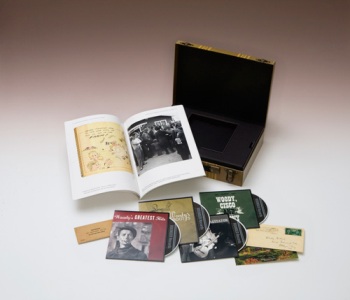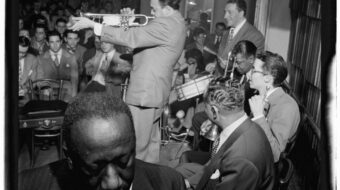
Music Review
My Dusty Road
By Woody Guthrie
Rounder Records, 2009, $75.99, 4 disc boxed set
The elusive spirit of Woody Guthrie, mired by the echo of decades-old record pressings and multi-generational copies of scratchy discs, has finally emerged— and just in time to offer a soundtrack to today’s activism. With the discovery of original 78 RPM metal masters of the legendary folksinger’s mid-1940s recordings, contemporary listeners can finally hear exactly what Guthrie sounded like in his prime. Untouched over the decades, thought lost but discovered in a Brooklyn basement, these tracks take us to the period of Woody’s life when he was playing a Gibson decorated with “This Machine Kills Fascists” splashed across its soundboard.
With WWII raging in Europe, Woody answered the call and joined the United States Merchant Marines. He remained a zealous activist for workers’ rights (evidenced here by the presence of many union songs). But like progressive activists all around him, he recognized that the big fight was one in response to the ultimate repression, fascism. In between Merchant Marine trips, whenever Woody returned home he would head for Moses Asch’s Folkways studio. Asch generally gave him free rein and Woody responded by laying down a wide array of tracks, often with Cisco Houston and Sonny Terry in tow. As Asch later wrote, it was as if Woody was trying to record everything, uncertain as to the outcome of his next naval sojourn. While he came back from his trips at sea relatively unscathed, we are a much better people for all of his prolific anxiety.
The four compact discs that comprise “My Dusty Road” are not only of alarmingly good sound quality – there’s nothing like hearing Woody take a breath in between verses! – but its also a definitive “greatest hits” collection. And this collection reveals even more than great music: here you’ll find a 68-page color book including detailed liner notes, some of Woody’s lyric sheets and artwork, and rare or never before seen photographs. The actual box of this boxed set is designed to look like the beat-up suitcase of a beat-down traveler who’d been through it all but looked toward better days to come.
In the 1930s, Guthrie was among the thousands who made their way to California from the depressed dustbowl of Oklahoma and Texas. His music became one of the sparks of life for the huddling masses after they’d lost all and arrived in the “promised land” of Los Angeles. As many later said, Woody’s music broadcast over the local radio airwaves gave their ragged existence a sense of being. He sang of the hardships of “the Okies,” the cruel opportunism of the orchard owners and employment agents, and the brutality many migrants experienced at the hands of the police, “railroad bulls” and goon squads. These were hard, hard times.
Over the next decade or so, whenever he’d lose a job due to broadcasters’ or club owners’ reactionary responses to his songs of pride and protest, Woody would simply seek out another; Guthrie refused to compromise his social justice morays. His personal contradictions – leaving behind one family in the thicket of dust and poverty and ultimately building a new one he could ill care for – remain a part of his legend. Guthrie had been preaching radical politics for years before becoming a member of a cultural branch of the Communist Party USA in New York City [and cultural editor of the Daily Worker, this paper’s predecessor]. He seemed to move through his own contradictions as he did the challenge of working toward industrial unionism, civil rights and social change in the face of rabid reactionaries.
The music speaks for itself: “This Land is Your land”, “Philadelphia :Lawyer”, “The Sinking of the Reuben James”, “Pretty Boy Floyd”, “Hard Travelin’, “Jesus Christ”, “A Picture From Life’s Other Side”, “Hard Ain’t It Hard” are just a few of the familiar titles. But then there’s the stirring anti-lynching piece “Hangknot”, the powerful “Union Burial Ground” and a wealth of rare material such as “Harriet Tubman’s Blues” – and six previously unreleased songs including “Tear the Fascists Down”. In evidence in ‘My Old Dusty Road’ is Woody’s time spent riding rails as well as the cargo ships of his war-time service. You can feel the sweat, the struggle, the urgency. And if you listen especially closely, you can almost see him singing from the podiums of William Z Foster and Elizabeth Gurley Flynn. Here is the sound of a musical revolutionary, in living color.
For more information visit The Official Woody Guthrie Website: www.woodyguthrie.org











Comments